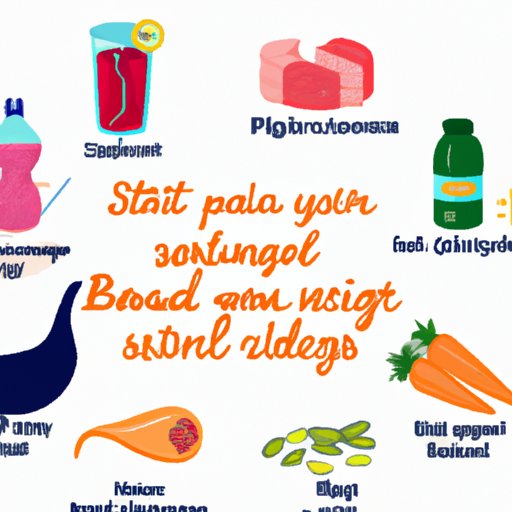
Introduction
Bloating is a common gastrointestinal issue that affects people of all ages. It is a condition in which the stomach becomes visibly swollen and is often accompanied by discomfort and a feeling of fullness. While bloating is not usually serious, it can be uncomfortable and can interfere with daily activities. Therefore, it’s important to know how to prevent bloating.
Watch Your Diet
Bloating is often caused by certain foods and beverages that can lead to gas formation in the stomach. To prevent bloating, it’s important to avoid these foods. Some foods that commonly cause bloating include: beans, cruciferous vegetables (broccoli, cauliflower, cabbage), onions, garlic, dairy products, sugary foods, and processed foods.
These foods contain high levels of fiber, lactose, and sugar alcohols, which may not be well-digested and can cause gas and bloating. Instead, opt for foods that are easy to digest such as bananas, white rice, and boiled potatoes. You can also eat foods that are rich in potassium like avocados, leafy greens, and sweet potatoes. These foods can help reduce water retention in the body and alleviate bloating.
Stay Hydrated
Water is essential for overall digestive health and can also play a crucial role in preventing bloating. Drinking enough water can help keep food moving through the digestive system, avoid constipation and ensure that the body doesn’t hold on to excess water, which can cause bloating.
Experts recommend drinking at least eight glasses of water a day. If you find it challenging to drink that much water, you can add some flavor to it by infusing it with fruits like lemon, berries or cucumber. You can also drink herbal teas, like peppermint or chamomile, which have been shown to help reduce bloating.
Exercise
Exercise is an effective way to prevent bloating as it helps stimulate bowel movement and prevents constipation. It also helps reduce stress, which is one of the causes of bloating.
There are different types of exercises that can help alleviate bloating, including yoga, Pilates, and cardio workouts. Yoga can be particularly effective as it focuses on breathing and stretching, which can help reduce gas and improve digestion. However, it’s important to avoid exercises that involve bending, twisting or lying down, as these can worsen bloating.
Experts recommend doing at least 30 minutes of exercise per day to prevent bloating. You can also incorporate walking into your daily routine, like taking the stairs instead of the elevator or going for a brisk walk during your lunch break.
Eat Small Meals
Eating large meals can cause the stomach to become overloaded, leading to bloating. To prevent this, it’s better to eat small meals throughout the day. This approach will help keep your digestive system working efficiently and avoid overloading your stomach.
Eating small meals can also help control blood sugar levels, increase metabolism, and reduce hunger pangs. Try to include foods that are high in protein, like eggs or nuts, as they can help keep you feeling fuller for longer, leading to fewer food cravings.
Avoid Carbonated Beverages
Carbonated beverages such as soda or sparkling water can cause bloating because they contain gas that gets trapped in the stomach. These drinks can also contain high amounts of sugar, which can cause inflammation and worsen bloating symptoms.
If you’re looking for an alternative to carbonated beverages, try drinking water infused with fruits or herbal tea, which can help reduce bloating and keep you hydrated throughout the day.
Reduce Salt Intake
Consuming too much salt can lead to water retention in the body, which can cause bloating. To prevent this, it’s important to reduce salt intake in your daily meals.
You can do this by avoiding processed foods, which often contain high levels of salt, using herbs and spices to flavor your food instead of salt, and reading labels on food packaging to track salt intake. You can also increase potassium-rich foods in your diet, which can help flush out excess sodium from the body.
Try Probiotics
Probiotics are beneficial bacteria found in fermented foods such as yogurt, kefir, and sauerkraut. They help maintain a healthy digestive system and prevent bloating by improving the gut microbiome.
Research has shown that consuming probiotics can help reduce bloating, abdominal pain, and gas. If you’re not a fan of fermented foods, you can also take probiotic supplements, which come in various forms such as capsules, powders, and liquids.
Conclusion
Bloating can be an uncomfortable and frustrating experience, but there are various ways to prevent bloating. By watching your diet, staying hydrated, exercising regularly, eating small meals, avoiding carbonated beverages, reducing salt intake, and trying probiotics, you can alleviate bloating and improve your digestive health.
Remember, it takes time to figure out which prevention method works best for you. So, don’t get discouraged if you don’t see any immediate results. Keep trying different methods and stay consistent with your efforts, and you’ll soon find relief from bloating.





